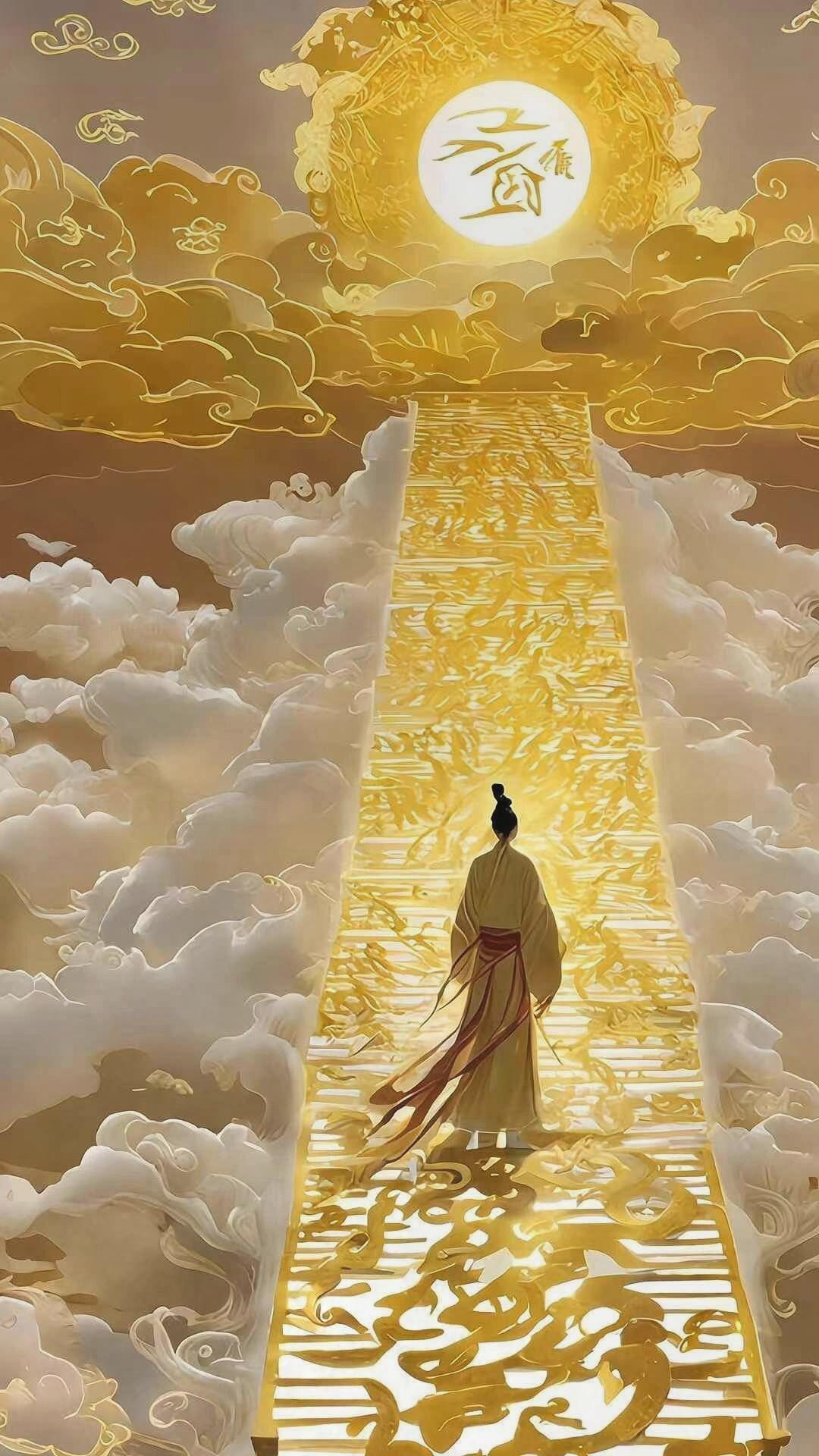In the remote and mysterious ancient times, there was a peaceful small mountain village. In the village lived an old man in poverty. His thatched cottage was dilapidated, and his family often had nothing to eat. The hardships of life had carved deep wrinkles on his face. However, the old man was kind-hearted. Despite being in a difficult situation, he always cherished good intentions and was full of awe for everything in the world.
One day, as usual, the old man went to the mountain to cut firewood. Deep in the mountain forest, he accidentally discovered a cave that emitted a strange light. Driven by curiosity, he cautiously walked into the cave. Inside the cave, the mist was swirling, and in the middle sat an old man with white hair and an air of a celestial being. It was Taishang Laojun. Holding a whisk in his hand, Taishang Laojun looked at the poor man with kind eyes and said, "You are a kind-hearted person who has suffered a lifetime of hardship. Today, I will give you this magical jade. This jade contains endless power and can bring you good luck, but you must remember that you must not be greedy." The old man took the jade in fear and quickly bowed to thank Taishang Laojun.
When the old man took the jade back home, something miraculous happened. The originally barren fields were suddenly covered with robust crops overnight, and the few scrawny poultry at home became plump and strong. Gradually, wealth poured in like a tide. His thatched cottage was rebuilt into a spacious and bright mansion, and his home was filled with gold and silver. But the old man never forgot Taishang Laojun's instructions. He knew deeply that all this good luck was not something he deserved but a gift from heaven and the mercy of Taishang Laojun.
Therefore, the old man began to use his wealth to help others in the village. He funded the construction of a school so that all the children in the village could learn to read and write. He sent food and clothes to poor families so that they would no longer suffer from hunger and cold. He also built wells beside the village roads to make it convenient for the villagers to fetch water. As his acts of kindness increased, his reputation spread farther and farther. People from surrounding villages all heard about this kind and wealthy old man and came to visit him one after another, asking him for the secret of getting rich. The old man always smiled and told them, "It's not that I have anything special. It's the blessing of Taishang Laojun. When good fortune comes, we should be grateful and not greedy, and we should use this good luck to help others."
During this process, there was a young man named Afu. When he saw the old man's wealth and reputation, his heart was full of envy and jealousy. He thought to himself, "It's just a piece of jade. If I could get it, I would surely become even richer than him." So, Afu sneaked into the old man's house in the dead of night, intending to steal that magical jade. But when his hand just touched the jade, the jade suddenly emitted a strong light and knocked him to the ground. Afu was extremely frightened. He realized that his greed had violated some mysterious power.
Hearing the noise, the old man rushed over. Seeing Afu lying on the ground, he didn't blame him. Instead, he helped him up and said earnestly, "This jade is not a magic weapon that brings endless wealth. It's a test of our morality by Lord Laozi. Greed will only make us lose everything, while gratitude and kindness are the real paths to wealth." After hearing this, Afu was filled with shame. He confessed his mistake to the old man and decided to turn over a new leaf.
As time passed, this small mountain village became prosperous and thriving with the help of the old man. The villagers lived in harmony and helped each other, just like a paradise. And the story of Taishang Laojun's gift of wealth also spread in this land and became a much-told tale. It's not just a story but a vivid manifestation of Taoist thought. Taoism advocates that people should conform to nature, be grateful, and abandon greed. When good luck comes, one should not indulge in material enjoyment but think about how to let this good luck benefit more people.
In the classic teachings of Taoism, there are many similar concepts. For example, "Fortune lies where misfortune lurks; misfortune lurks where fortune lies." It tells people that wealth and fortune are not eternal. Greed may turn good luck into disaster. When facing wealth, the old man could keep a clear head, precisely because he had grasped this dialectical thinking of Taoism. He understood that if too much wealth was just hoarded, it would eventually bring misfortune. Only by using it to benefit others could the energy of wealth flow in a positive direction.
Another example is "The highest good is like water. Water benefits all things without contending with them." The old man's behavior was just like the water that nourishes all things. He didn't keep the wealth for himself but quietly contributed to the villagers, just like water moistening the earth, without asking for anything in return. This realm is exactly the supreme good realm advocated by Taoism. In the ideological system of Taoism, what people pursue is not personal fame and fortune but a realm of harmonious coexistence with heaven and earth and common prosperity with all things.
The old man in this story is like a bright lamp, illuminating people's in-depth thinking about the relationship between morality and wealth. He used his own practical actions to interpret the application of Taoist thought in real life. And Taishang Laojun's act of giving the jade was also like a divine revelation, guiding people to explore the true meaning and value of life.
From a more macroscopic perspective, this view of wealth and morality in Taoist thought has far-reaching significance for the harmony and stability of the whole society. In a society, if everyone can be like the old man in the story, being grateful when good fortune comes, not being greedy, and actively giving back to the society, then this society will be full of love and warmth. The gap between the rich and the poor will no longer be the root of contradictions but an opportunity for mutual assistance. People will pay more attention to spiritual pursuits instead of simply chasing material wealth.
Looking back at history, there were many people who achieved extraordinary things by following Taoist thought. They either relieved the common people with charitable acts in troubled times or adhered to morality in times of prosperity.



